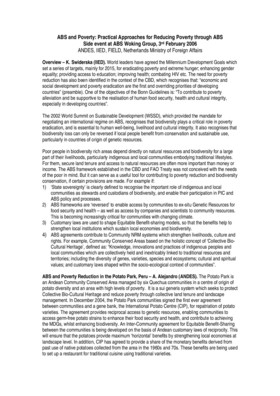ABS and Poverty: Practical Approaches for Reducing Poverty through ABS
Report of a side event at the Access and Benefit Ssahring Working Group held on 3rd February 2006.
World leaders have agreed the Millennium Development Goals which set a series of targets, mainly for 2015, for eradicating poverty and extreme hunger; enhancing gender equality; providing access to education; improving health; combating HIV etc. The need for poverty reduction has also been identified in the context of the CBD, which recognises that: "economic and social development and poverty eradication are the first and overriding priorities of developing countries" (preamble). One of the objectives of the Bonn Guidelines is: "To contribute to poverty alleviation and be supportive to the realisation of human food security, health and cultural integrity, especially in developing countries".
The 2002 World Summit on Sustainable Development (WSSD), which provided the mandate for negotiating an international regime on ABS, recognises that biodiversity plays a critical role in poverty eradication, and is essential to human well-being, livelihood and cultural integrity. It also recognises that biodiversity loss can only be reversed if local people benefit from conservation and sustainable use, particularly in countries of origin of genetic resources.
Case study of the Potato Park project in Peru. Sovreign Rights and Development Agency perspective also given.
Cite this publication
Available at https://www.iied.org/g01055
